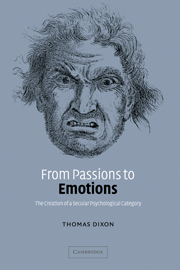Book contents
- Frontmatter
- Contents
- Acknowledgments
- Note on quotations
- 1 Introduction: from passions and affections to emotions
- 2 Passions and affections in Augustine and Aquinas
- 3 From movements to mechanisms: passions, sentiments and affections in the Age of Reason
- 4 The Scottish creation of ‘the emotions’: David Hume, Thomas Brown, Thomas Chalmers
- 5 The physicalist appropriation of Brownian emotions: Alexander Bain, Herbert Spencer, Charles Darwin
- 6 Christian and theistic responses to the new physicalist emotions paradigm
- 7 What was an emotion in 1884? William James and his critics
- 8 Conclusions: how history can help us think about ‘the emotions’
- Bibliography
- Index
6 - Christian and theistic responses to the new physicalist emotions paradigm
Published online by Cambridge University Press: 22 September 2009
- Frontmatter
- Contents
- Acknowledgments
- Note on quotations
- 1 Introduction: from passions and affections to emotions
- 2 Passions and affections in Augustine and Aquinas
- 3 From movements to mechanisms: passions, sentiments and affections in the Age of Reason
- 4 The Scottish creation of ‘the emotions’: David Hume, Thomas Brown, Thomas Chalmers
- 5 The physicalist appropriation of Brownian emotions: Alexander Bain, Herbert Spencer, Charles Darwin
- 6 Christian and theistic responses to the new physicalist emotions paradigm
- 7 What was an emotion in 1884? William James and his critics
- 8 Conclusions: how history can help us think about ‘the emotions’
- Bibliography
- Index
Summary
Superficial sciolists in philosophy have need to learn as a first lesson, that the physiologist and pathologist, as such, can have nothing to do with what transcends the sphere of the mere corporeal organism. It is the proper province of the psychologist to investigate the soul and its mind.
Thomas Gorman, Christian Psychology: The Soul and the Body in their Correlation and Contrast, 483Emotion is not what has often been presented by physiologists, a mere nervous reaction from a bodily stimulus, like a kick which the frog gives when it is pricked. It begins with a mental act, and throughout is essentially an operation of the mind.
James McCosh, The Emotions, 4Religion, materialism and the mind
There was no single Christian or theistic response to physiological and evolutionary psychological theories of emotions. Given the importance in the Christian tradition, from Genesis to Augustine and beyond, of the division between man and the lower animals, however, it is perhaps not surprising to find that attempts to equate human and animal emotions raised more opposition from some Christian conservatives even than the attempt to correlate emotions with physiological activity. Martyn Paine was quite typical of Christian writers in his rather generous and inaccurate use of the label ‘materialist’ for thinkers writing within positivist, physiological or evolutionary schools of thought.
- Type
- Chapter
- Information
- From Passions to EmotionsThe Creation of a Secular Psychological Category, pp. 180 - 203Publisher: Cambridge University PressPrint publication year: 2003

